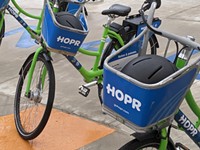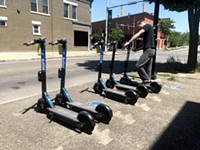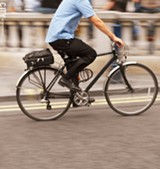[
{
"name": "500x250 Ad",
"insertPoint": "5",
"component": "15667920",
"parentWrapperClass": "",
"requiredCountToDisplay": "1"
}
]
Urban bike-share programs aren't the big-city novelty they used to be; smaller metros such as Boise and Buffalo have programs now, and Rochester is looking into starting one, too.
City officials don't want to put a substantial amount of taxpayer money into the project, though, so they're seeking a company, a nonprofit, or some combination of the two to take it on. Proposals are due by August 3.
In the eyes of public transit and active transportation advocates such as Mike Governale, president of Reconnect Rochester, bike share's time has come.
"It's something that Rochester absolutely needs," he says. "I don't see bike share as a nice-to-have or a fringe benefit. I think it's something that's very necessary in attracting new people to come and live and work in the city, and also helping to offset transportation costs."
Erik Frisch, transportation specialist for the city, says that bike shares are increasingly expected in cities, even those Rochester's size.
The city wants a phased program, starting with 25 stations and 250 bikes in downtown and its adjacent neighborhoods, such as Park Avenue. Those numbers track the recommendations in a 2014 Genesee Transportation Council bike-sharing feasibility study done for Rochester and its suburbs. The study recommends a four-phase approach.
City officials want a system that meets the needs of several types of users, including college students, visitors, residents commuting to work, and residents who want to use the bikes for recreation or to meet friends somewhere.
If done right, the bike-share system has the potential to both get people out of their cars and to complement the region's bus system, Frisch says. For example, people may be able to take the bus from one stop to another, and then take a bike the rest of the way.
"It's a new mobility option for people: residents, visitors, and others in the city," he says. "We think that it'll support economic growth here, whether that's increased retail sales for small businesses or serving as a distinguishing feature for the city — a competitive advantage, if you will, for attracting and retaining businesses and jobs and investment and workers."
A bike-share system would be the latest in a string of bicycle-oriented projects in the city. Rochester is approaching 100 miles of bike lanes, shared use lanes, and other road features; the milestone should be reached sometime next year, Frisch says. Many cyclists, especially less experienced ones, feel more comfortable biking when they know they have a designated place on the road, he says.
Few cities of Rochester's size run bike-sharing systems themselves, Frisch says. Most have solicited vendors to do the work.
Buffalo is a recent example. Reddy Bikeshare launched in the city with 200 bicycles last week. The program is a partnership between Independent Health and Shared Mobility, Inc., a Buffalo nonprofit that previously worked to build up the metro's car-sharing network.
The Reddy system uses equipment and a mobile app platform developed and marketed by Social Bikes. Users buy a monthly pass for $8.50, and then pay 6 cents for every minute that they use the bike. Or $55 for a yearly pass and 1 cent for every minute they use the bike. They can find and reserve a bike via the mobile app, and to access the bike, they type a provided pin into what is, essentially, a high-tech U-lock.
The system is different than New York City's Citi Bike and Washington, DC's Capital Bike Share programs, which use large dock systems to lock, release, and accept the bikes. Smartbike systems like Buffalo's are cheaper to purchase and are more flexible when it comes to distributing the bikes, Frisch says.
Smartbike systems rely on mobile phones and credit cards, which are convenient for many users. But the arrangement brings up equity issues, since not everyone in the Rochester region can afford a smartphone or has a credit card — a card is usually required to check out a bike. The city has asked the people who respond to its request for proposals to include ideas to address those issues.
Rochester officials favor the smartbike systems because of the systems' flexibility and cost benefits. In fact, they may be key to the sustainability of the whole project.
The 2014 GTC study says that a bike-share system could be viable in Rochester and Monroe County, but it would likely operate at a loss. But its conclusion is based on costs associated with the more expensive dock systems, which were the prevalent technology at the time. The smartbike systems provide better odds that the selected operator will be able to stay in the black, Frisch says.
The city repeatedly and bluntly states in its request for proposals that it will not provide funding for construction, operation, or maintenance of a bike-share system. It will, however, help with marketing and recruiting sponsors, Frisch says.
Sponsorships will probably be the key to a viable system in Rochester, he says.
"There's a few ways of doing that, whether it's one large title sponsor or different sponsors based on stations or station locations," Frisch says.
Portland's Biketown started earlier this month with Nike as the title sponsor; the company's iconic swoosh is on all of the bikes, which are the same color orange as the brand's shoeboxes. Kansas City's nonprofit B-Cycle uses a mix of corporate sponsorships, government and philanthropic grants, community improvement district grants, and other sources to fund new stations and pay for operations.
But a big sponsorship is no guarantee of a self-sustaining bike-share system. Seattle's City Council voted in May to buy out the struggling Pronto bike-share system there, at a cost of $1.4 million. Officials are looking for another operator.
The system started two years ago with $1.25 million from the state and federal governments, as well as big sponsorships, including $500,000 from Seattle Children's Hospital and $2.5 million from Alaska Airlines, according to the Seattle Times.
But ridership was lower than expected, which meant that the operator wasn't hitting revenue targets, the Times says. Seattle officials said that they believe that the system hasn't spread to enough locations, and that they plan to expand it.
Reconnect Rochester's Governale says that two things have to happen for bike sharing to work in Rochester. For one, the governments and groups in the community need to put more energy into getting people on bikes, he says.
And businesses and groups in the community have to buy into the idea, and that means sponsoring stations, he says. Governale and Frisch say that downtown developers want the bike share to happen, and that it might make sense for them to sponsor stations near their properties, for example.
Governale says that Reconnect Rochester and the Rochester Cycling Alliance have talked about working together to sponsor a station.
"It's something we're all going to have to step up and help out with," he says.
What do you think about a possible bike-share program in Rochester? Let us know at #biketheroc
Speaking of...
-

ESL grant funds HOPR bike and scooter stations
Sep 15, 2021 -

HOPR bike and scooter share program rolls out in Rochester
Jun 7, 2021 -

Yes, bikes are ‘essential,’ state says
Mar 26, 2020 - More »
Latest in News
More by Jeremy Moule
-

ROCHESTER TEN
ANNETTE RAMOSAug 1, 2023 - More »






